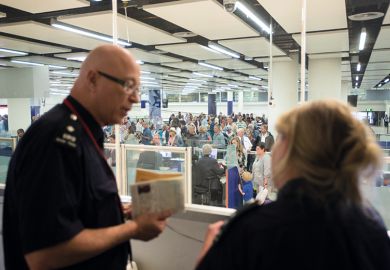A master’s student who struggled to obtain extensions to her studies after being diagnosed with terminal cancer has been awarded a substantial pay-out from the University of Warwick, whose staff have admitted “we got it wrong”.
Riham Sheble said that compensation of £12,000 represented a “significant victory” for migrant students with disabilities in the UK.
Ms Sheble, who is originally from Egypt, started a film and television course at Warwick in 2018 but has been unable to complete her studies after first being sexually assaulted and then diagnosed with uterine sarcoma, a rare and aggressive form of cancer, that has spread to her spine.
Her latest extension request in April 2022 was initially turned down by the university, putting her future right to stay in the country and access healthcare in jeopardy. Although this decision was eventually overturned, Ms Sheble pursued a complaint for the distress caused.
“The University of Warwick’s initial decision denying me an extension of study period was completely unnecessary,” she said.
“These battles were imposed on me at a time when I was contending with death and at war with my own body. I was forced to fight on so many fronts. It was exhausting. More importantly, it was utterly unjust.”
Ms Sheble sought legal advice that indicated the university may have breached its obligations under the Equality Act. She has argued that the cancer should have been seen as a disability and the university had a responsibility to make reasonable adjustments to allow her to finish her studies.
A Warwick spokeswoman said the complaint had been formally investigated and it was determined that “we could have shown greater flexibility in this case. We accepted this conclusion and recognised we had got this wrong – and then worked to put it right.”
Unis Resist Border Controls (URBC), the campaign group that has supported Ms Sheble, said the case was representative of the way many international students were treated with suspicion while in the UK, due to the UK government’s “hostile environment” immigration policies.
Ms Sheble has also faced difficulties securing a visa to allow her mother to visit her in hospital. She likened the situation to “a nightmarish loop of déjà vus, where dreadful things kept happening and repeating themselves endlessly with no respite”.
Colleagues at Warwick and Shabana Mahmood, MP for Birmingham, Ladywood, lobbied the Home Office to grant the visa, and Ms Sheble has now been reunited with her mother.
URBC said it was pleased with the outcome of the complaint but it would continue to challenge Warwick to improve the hardship grants it offers to international students, and the procedures it uses for filing mitigating circumstances.
The Warwick spokeswoman did not confirm the amount paid but said paying compensation was the “right thing to do” rather than contest the complaint through what she called “a potentially lengthy complaints process”.
“We’re sorry for the way the student was made to feel through this process, which came during a very difficult and challenging time for her. We have sent a letter to her to offer our sincere apologies,” the spokeswoman said.
Register to continue
Why register?
- Registration is free and only takes a moment
- Once registered, you can read 3 articles a month
- Sign up for our newsletter
Subscribe
Or subscribe for unlimited access to:
- Unlimited access to news, views, insights & reviews
- Digital editions
- Digital access to THE’s university and college rankings analysis
Already registered or a current subscriber?








